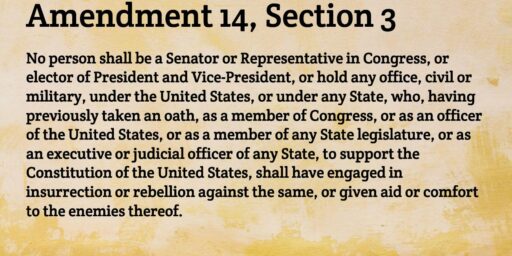Is Rep. Giffords In Danger Of Losing Her Seat Due To Being Hospitalized?
An obscure Arizona law has raised questions over whether Congressman Gabrielle Giffords could lose her seat if she is disabled for an extended period.
An obscure bit of Arizona law has some people wondering if Congresswoman Gabrielle Giffords is in danger of losing her seat in Congress if she has to undergo an extended recovery:
A statute buried in state law says that if a public officeholder ceases to “discharge the duties of office for the period of three consecutive months,” the office shall be deemed vacant and that at such time, a special election could be called to fill the opening.
But in Washington, lawyers quickly concluded that the statute does not apply to members of Congress. The U.S. Constitution provides the qualifications for service in Congress and makes the House the sole judge of those qualifications.
Courts have consistently held that states cannot add qualifications to those in the Constitution and have rejected efforts to remove members of Congress, even through term limits and recalls.
“Legally, it’s not a close call,” said Brian Svoboda, a lawyer for the Democratic Party. “You have a history of interpreting these constitutional decisions and the courts have consistently struck down state laws that have tried to impose additional qualifications beyond those that are set forth in the Constitution.”
It’s really a fairly simple question that Courts have dealt with quite easily in recent years.
The Constitution provides, in both Article I Section 2 and Article I Section 3 for the qualifications to hold office in Congress.
For the House it says:
No Person shall be a Representative who shall not have attained to the Age of twenty five Years, and been seven Years a Citizen of the United States, and who shall not, when elected, be an Inhabitant of that State in which he shall be chosen (Article I, section 2),
And for the Senate it says:
No Person shall be a Senator who shall not have attained to the Age of thirty Years, and been nine Years a Citizen of the United States, and who shall not, when elected, be an Inhabitant of that State for which he shall be chosen (Article I, section 3).
Additionally, the 17th Amendment says:
The Senate of the United States shall be composed of two Senators from each State, elected by the people thereof, for six years; and each Senator shall have one vote. The electors in each State shall have the qualifications requisite for electors of the most numerous branch of the State legislatures.
In U.S Term Limits v. Thornton, the Supreme Court struck down an Arkansas law that purported to impose a term limit on the state’s Congressmen and Senators and said the following in doing so:
The provisions in the Constitution governing federal elections confirm the Framers’ intent that States lack power to add qualifications. The Framers feared that the diverse interests of the States would undermine the National Legislature, and thus they adopted provisions intended to minimize the possibility of state interference with federal elections.
(…)
In our view, Amendment 73 is an indirect attempt to accomplish what the Constitution prohibits Arkansas from accomplishing directly. As the plurality opinion of the Arkansas Supreme Court recognized, Amendment 73 is an “effort to dress eligibility to stand for Congress in ballot access clothing,” because the “intent and the effect of Amendment 73 are to disqualify congressional incumbents from further service.” 316 Ark., at 266, 872 S. W. 2d, at 357. 42 We must, of course, accept the State Court’s view of the purpose of its own law: we are thus authoritatively informed that the sole purpose of 3 of Amendment 73 was to attempt to achieve a result that is forbidden by the Federal Constitution.
More recently, the New Jersey Supreme Court ruled that the state’s law allowing for recall of elected officials via popular referendum could not be applied to Federal officials:
A recall committee cannot proceed with its effort to unseat U.S. Sen. Robert Menendez, the state Supreme Court ruled today in a decision that strikes down part of the state constitution.
Voting 4-2, the justices said parts of the state law and constitution that allow such recalls are unconstitutional. The decision reverses an appellate court, which had said the recall could proceed but stayed its decision to allow Menendez to appeal.
“The text and history of the Federal Constitution, as well as the principles of the democratic system it created, do not allow the states the power to recall U.S. Senators,” Chief Justice Stuart Rabner wrote for the majority.
(…)
Justice Jaynee LaVecchia pointed out the notion of recalling members of the House of Representatives — U.S. senators originally were chosen by state legislatures — got a thumbs down from the founders. Justice Virginia Long agreed.
The losing side in the New Jersey case has said that they would appeal the case to the U.S. Supreme Court, but their appeal is unlikely to be granted, and unlikely to be ruled upon in time for the 2012 elections if it were.
What these two cases, and others, stand for is the simple idea that states cannot impose additional requirements on Members of Congress beyond those set forth in the Constitution. That means Arkansas cannot impose term limits, the citizens of New Jersey cannot recall an elected Senator, and this Arizona law cannot be applied to Congresswoman Giffords.
That said, the Giffords case does raise another issue for which there is also no Constitutional provision. The Constitution says nothing about how to deal with a Congressman or Senator who may be disabled and unable to fulfill for the duties of their office. This means that a Senator could have a stroke, be disabled for years and unable to work, and the people of their state would be without representation. I’m not suggesting this is a crucial problem, but it is interesting that we have specific provisions for Presidential disability, but nothing to deal with a similar situation in the Legislative and Judicial Branches.
H/T: Jazz Shaw






If Giffords determines that, due to circumstances, it is better for the citizens of her district that someone else complete the balance of her term, she would be doing the honorable thing to resign.
This goes for Governors as well as Representatives
.
I brushed up on some of this when Tim Johnson had that stroke (which, fortunately, he seemed to recover from pretty quickly). I’m really not as worried about congresspeople, who can only be out of commission for a couple of years at most (unless they get re-elected, in which case it’s hard for anyone to complain). You’d think that they would want something in place for senators, though. Can you even accept the resignation of someone that is not conscious or mentally fit to give it? Is there a protocol in place? I never found out.
I propose we test every year to determine the mental competence of congressmen and senators. Imagine the savings when 535 is reduced to three dozen. They could meet at the nearest bar and the country would at last be saved.
I really hope that jwest has never complained about OTB dragging Palin into ever topic…. ‘
Somehow I doubt it, but I really don’t want to search.
I was just saving Doug the trouble.
“I propose we test every year to determine the mental competence of congressmen and senators. Imagine the savings when 535 is reduced to three dozen. They could meet at the nearest bar and the country would at last be saved.”
Where are you going to find three dozen mentally (or otherwise) competent congressmen and senators?
It is an area like “how to” replace a congressman in which I think should be determine by the State. The Article sited states what is needed to become a Congressman. One can argue if one dies, they still fulfill those requirements. In fact dead people have been elected to Congress and died while in congress.
Does that mean that it was unconstitutional for the States to have replaced them?
How about if we test them to see if they know Jack?
http://www.aolnews.com/2011/01/14/opinion-who-are-the-constitutional-illiterates/?a_dgi=aolshare_twitter#position1
H/T The Blaze……
I question whether the Arkansas case really covers this situation. The Constitution and that case deal with the conditions for someone seeking office, not ability to serve once elected. This may not be as well settled as it seems, though I wish it was.
Reynolds, do something about those pictures of whatever that is you have by your name. It frightened some small children today and now I must take them to therapy. It will be your fault if they turn out to be serial killers. I did not think the Constitution addressed what a State can do about a representative who is unable to do the job. The place she works is call the House of Representatives. When she can no longer represent those who sent her there, seems to me it woiuld be up to the people who hired her if she can continue, not those with whom she works.
@Wayne
“In fact dead people have been elected to Congress and died while in congress.”
Now there’re some term limits.
@Justice Zelsdorf:
” I did not think the Constitution addressed what a State can do about a representative who is unable to do the job.”
Article 1, Section 5, Clause 1:
Each House shall be the Judge of the Elections, Returns and Qualifications of its own Members
I.e., a State can do zip.
@Doug
” The Constitution says nothing about how to deal with a Congressman or Senator who may be disabled and unable to fulfill the duties of their office. This means that a Senator could have a stroke, be disabled for years and unable to work, and the people of their state would be without representation.”
Article 1, Section 5, Clause 2
Each House may determine the Rules of its Proceedings, punish its Members for disorderly Behaviour, and, with the Concurrence of two thirds, expel a Member.
It might be possible, I think, given the scenario you laid out, that the Senate or the House could expel such an incapacitated member, relying on Article 1, Section 5, Clauses 1 and 2. I’m taking the word ‘qualification’ in an expansive sense (and not tying expulsion to disorderly conduct). I know there’s case law that says ‘qualification’ cannot be so taken — Powell v. McCormack (1969) –but that case concerned seating a duly elected representative, not an already seated, but incapacitated member.
Of course, the chance that either house would expel a member for incapacitation is vanishingly (If I recall, Charles Sumner did not return to the Senate for three years after having been beaten senseless by Preston Brooks). But I think the House and the Senate might have to power.
“Each House shall be the Judge of the Elections, Returns and Qualifications of its own Members”
That applies for those seeking office not ability to serve once elected. Although Congress has a part in it but that doesn’t mean the States do not.
Is that supposed to mean that a member who has died while seeking and being in office can serve? Of course not.
Re “ I.E. a State can do zip”
So it is Congress who decides how to replace someone who has died in office and not the State?
As for this particular case, I suspect they will keep her slot open even if it passes the three months threshold. It is possible that she will resign if her recovery will take long time. Hopefully her recovery goes will.
That has not been settled in cases such as this, cases involving a sitting representative. I think Senate and House may have plenary power of expulsion.
No. A special election can be held, because of the special circumstance of the elected representative being dead and thus no longer having any qualifications at all. The question concerns a State’s power vis-a-vis a sitting, but incapacitated, representative. I maintain the state can do nothing.
I notice Wikipedia says that Brigham Henry Roberts of Utah was elected in 1900, but was not allowed to take office because he practiced polygamy. A special election was held and William H. King became the Representative.
I don’t know the details, but it sounds like an example of the House using plenary powers to disqualify an individual from seating based upon some perceived defect in charachter or reasoning.
>>>>>”In fact dead people have been elected to Congress and died while in congress.”<<<<
Yep, and I voted for him. Proudest moment of my electoral life.
With all sympathy to Giffords, she should be replaced. One thing that’s been a peeve of mine is the way various politicians go absent from their jobs for months on end, either for health reasons or due to lack of interest*, and expect their seat to be held in case they happen to return later. Their constituents have a right to representation, and shouldn’t be left with an empty chair for an extended period for the benefits of someone’s political career.
* – As example of the later, both Obama and McCain, putatively Senators, were AWOL for nearly two years during the last presidential cycle. The idea that a state can lose half its Senate representation for a full third of a term and neither is replaced is ridiculous.
Someone who is dead is a special circumstance but someone who is incapacitated is not?
Also if someone is dead they are qualified to be elected but are unqualified to serve?
Some states have special elections, some states have the Governor appoint someone to fulfill a remainder of the term and sometime they are left vacant.. Who decides how and even if to replace their representatives? The State does.
“When vacancies happen in the Representation from any state, the executive authority thereof shall issue writs of election to fill such vacancies.” Art. I, Sec. 2
“I propose we test every year to determine the mental competence of congressmen and senators. Imagine the savings when 535 is reduced to three dozen. They could meet at the nearest bar and the country would at last be saved.”
michael reynolds, I’m voting with you.
One little addition …. they need to be tested BEFORE their swearing-in ceremony …. as a baseline, of course. Although I suspect some would fail on DAY ONE.
“The laws of some “states” require the governor to call a special election to replace U.S. Senators. In states where replacements are appointed by the governor”
“While the Constitution does not mandate a method by which vacancies in the Senate are to be handled”
http://usgovinfo.about.com/library/weekly/blvacancies.htm
House Representative can be left vacant until the next election or a special election can be call.
@Wayne
Who decides how and even if to replace their representatives? The State does.
Wayne, did you miss this part of the post?
Seventeenth Amendment:
“When vacancies happen in the representation of any State in the Senate, the executive authority of such State shall issue writs of election to fill such vacancies: Provided, That the legislature of any State may empower the executive thereof to make temporary appointments until the people fill the vacancies by election as the legislature may direct.”